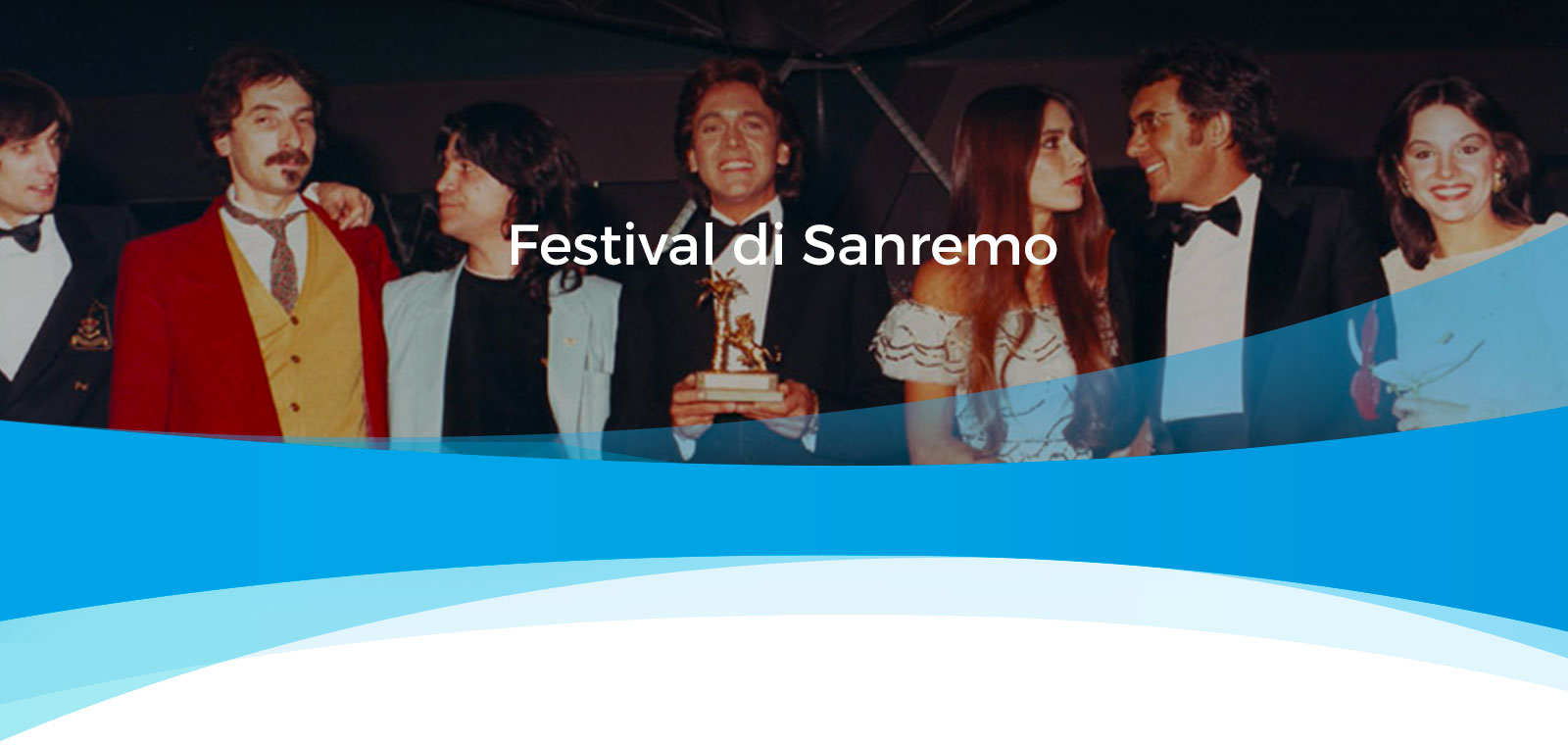
-
Genre Entertainment Year 1980/1993 Channel Rai 1 Synopsis
This is the most important Italian song Festival which started in the town of Sanremo, Italy in 1951. Initially broadcast on national radio, it then evolved into a yearly Television festival from 1955 on the (then) new Italian State Television channel RAI, which consolidated its timeless success. In 1977 the festival moved from Teatro del Casinò di Sanremo to the Teatro Ariston where it still remains today. The Festival of Sanremo is where original songs selected by a specific commission compete against each other through a voting system composed of Jury and popular audience votes. Other Awards are also assigned, including Best Young Artist. The Festival di Sanremo has been and continues to be one of the most important media events in Italy and abroad, enough to also inspire the Eurovision Song Contest, a competition where Singers and songs from all over Europe compete. Throughout Italy’s history from post-war years up to today, the Festival has continued being one of the most relevant cultural phenomenon of the country, with international guests and world-renowned show business stars. The most viewed edition (with 68.7 % average TV viewing share) was produced by Publispei in 1987.
-
Year 1980 Episodes 3 Channel Rai 1 Synopsis
The Ariston theatre hosts the 30th edition of Sanremo Music Festival
Presenters are Claudio Cecchetto, Roberto Benigni e Olimpia Carlisi.
The famous Tuscan comedian is uncontrollable on the stage and likes to shock the audiece with his humour and jokes: he turns to the Pope addressing him “Woytylaccio”, then he brings on stage a countryman of his, Giulio Cappelli who is a perfect stranger to the audience, but he is welcomed as a special guest and finally he kisses on the lips Carlisi. The kiss, that lasts 45 seconds, is broadcast in Eurovision and of course it causes a scandal.
Reporting from “Salone delle Feste del Casinò” is Daniele Piombi.
The 30 competing songs are divided into two categories: Category A – consists of 20 emerging singers, of which only 10 make it to the final round through votes of a panel of judges and the category B – consists of 10 “veterans” who go directly to the final.
There’s no orchestra and the artists sing on a pre-recorded accompaniment.
Guests of the event are; David Zed, Alberto Sordi, Giulio Cappelli, Pippo Franco, Dionne Warwick, Suzi Quatro, Billy Preston & Syreeta, Silverster, Status Quo, Sheila B. Devotion.
Rai Television airs the festival only on the final night.Competing songs:
Solo noi – Toto Cutugno
Ti voglio bene – Enzo Malepasso
Su di noi – Pupo
Canterò canterò canterò – Aldo Donati
Cavallo bianco – Paolo Riviera
Contessa – Decibel
Gelosia – Bobby Solo
Il sole canta – Orlando Johnson
I Sing For You – Sally Oldfield
L’italiano – Stefano Rosso
Ma vai vai – Giorgio Zito e i Diesel
Mara – Bruno D’Andrea
Mariù – Gianni Morandi
Musica regina – Leano Morelli
Passerà – Alberto Cheli
Più di una canzone – La Bottega dell’Arte
Tu cioè… – Peppino Di Capri
Tu mi manchi dentro – Leroy Gomez
Va’ pensiero – Linda Lee
Voglio l’erba voglio – Francesco Magni
Amor mio… sono me! – Omelet
Angelo di seta – Rimmel
Dal metrò a New York – Henry Freis
Dammi le mani – Mela Lo Cicero
E pensare che una volta… non era così! – Gianfranco De Angelis
Non ti drogare – Alberto Beltrami
Ritagli di luce – Latte e Miele
Ti desidero – Armonium
Tu che fai la moglie – Luca Cola
Tu sei la mia musica – Coscarella e PolimenoToto Cutugno wins the 30rd edition of the Festival with his song “Solo noi”.
and in this edition only the song in first place is announced. The remaining songs are all awarded a second place as joint winners.
Second and third position respectivey going to “Ti voglio bene” by Enzo Malepasso and “Su di noi” by Pupo –are announced on the following day by the press. -
Year 1981 Episodes 3 Channel Rai 1 Synopsis
The Ariston Theatre welcomes once again the Sanremo Festival on its 31st edition. The hosts are Claudio Cecchetto, Eleonora Vallone and Nilla Pizzi appointed patroness od the Festival. Franco Solfiti is broadcasting from the “Salone delle feste del Casinò”.
The 28 competing artists are divided into two categories: the first made of 12 veteran artists with the right to the finals; the second features 16 debuting singers who will get to the finals by jury vote.Competiting songs:
Per Elisa – Alice
Maledetta primavera – Loretta Goggi
Tu cosa fai stasera? – Dario Baldan Bembo
Roma spogliata – Luca Barbarossa
Sarà perché ti amo – Ricchi e Poveri
Hop hop somarello – Paolo Barabani
Ma chi te lo fa fare – Marinella
Su quel pianeta libero – Michele Zarrillo
Pensa per te – Marcella
Midnight – Passengers
Ancora – Eduardo De Crescenzo
Angela – Leano Morelli
La barca non va più – Orietta Berti
Blue (Tutto è blu) – Sterling Saint-Jacques
Caffè nero bollente – Fiorella Mannoia
Follow Me (Se amore vuoi) – Carmen & Thompson
Io mi – Stefano Tosi
Non posso perderti – Bobby Solo
Questo amore non si tocca – Gianni Bella
I ragazzi che si amano – Collage
Amore mio – Enzo Malepasso
Bianca stella – Sebastiano Occhino
Che brutto affare – Jo Chiarello
Guerriero – Gli Opera
Mille volte ti amo – Umberto Napolitano
Toccami – Tom Hooker
Tulilemble – Domenico Mattia
Un’isola alle Hawaii – Franco FasanoStarting from this edition, the Sanremo Festival will be broadcasted live again by RAI.
The song “Per Elisa” sung by Alice wins first place, followed by “Maledetta primavera” by Loretta Goggi and “Tu cosa fai stasera” by Dario Baldan Bembo.
Guests of the eveniings are Alberto Sordi, I Gufi, Giancarlo Giannini, Ugo Tognazzi, Sergio Leone, Eleonora Giorgi, Lando Buzzanca, Milva, Mario Merola, Lio, Charles Aznavour, Lio, Barry White, Dire Straits, Bad Manners, Robert Palmer.
The actor Massimo Troisi, just few minutes before his performance, refuses to go on stage because Rai censored his humor.
Among the promising artists of the 31st edition, stand out Luca Barbarossa, Fiorella Mannoia and Edoardo De Crescenzo.
This edition of the Festival officially marks the rebirth of the singing competition.
The Sanremo compilation climbs the music charts and becomes one of the best-selling albums in Italy in 1981.
In particular, the Festival of Sanremo theme song, Gioca jouer by Claudio Cecchetto, remains at the top of the single chart for months -
Year 1982 Episodes 3 Channel Rai 1 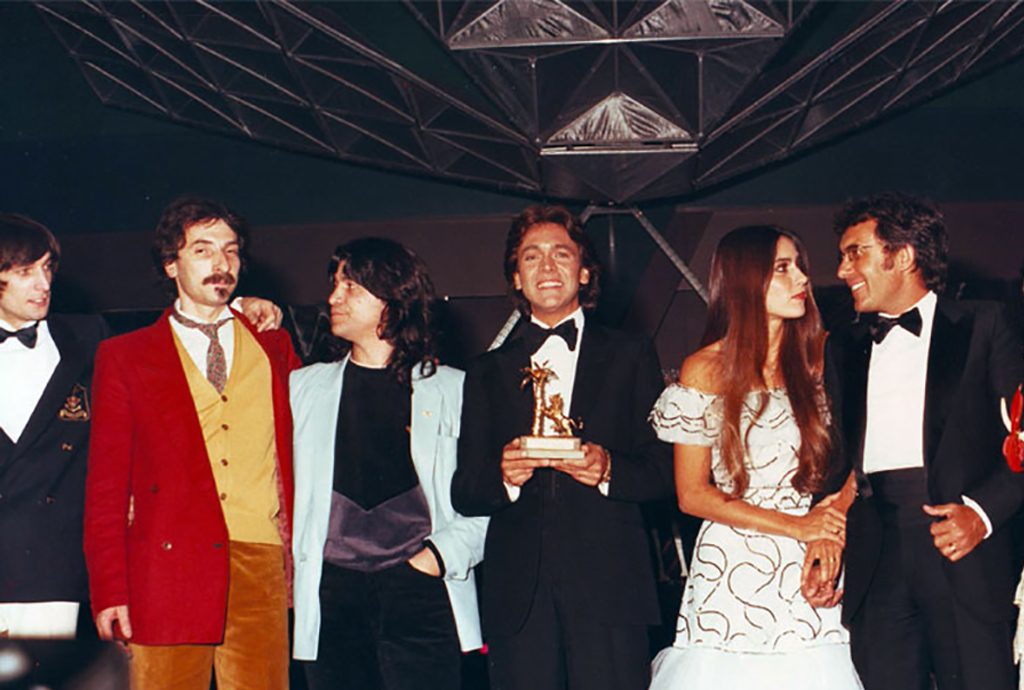
Synopsis
For the third year.in a row, Claudio Ceccheto is appointed host of the festival. Co-host on the stage of the Ariston theater is Patrizia Rossetti, who won the competition in the TV program “Domenica in” announced earlier.
Reporting from Salone delle feste del Casinò is Daniele Piombi.
The festival of Sanremo is broadcasted live by Rai on all three evenings and it reasserts itself as an event on a worlwide scale. Thirty singers are competing for first place, 14 veterans with a right to the final and 16 new artists to be judged by eight juries of 10 jurors each.Competing songs:
Storie di tutti i giorni – Riccardo Fogli
Felicità – Al Bano e Romina Power
Soli – Drupi
Beguine – Jimmy Fontana
Blue Hotel – Lene Lovich
C’è – Elisabetta Viviani
E non finisce mica il cielo – Mia Martini
Io no – Anna Oxa
Lisa – Stefano Sani
Marinai – Le Orme
Non voglio ali – Riccardo Del Turco
Ping pong – Plastic Bertrand
Quando incontri l’amore – Milk and Coffee
Romantici – Viola Valentino
Sei la mia donna – Mal
Sette fili di canapa – Mario Castelnuovo
Solo grazie – Giuseppe Cionfoli
Strano momento – Roberto Soffici
Tu stai – Bobby Solo
Un’altra vita un altro amore – Christian
Vado al massimo – Vasco Rossi
Una notte che vola via – Zucchero Fornaciari
America in – Orietta Berti
Biancaneve – Rino Martinez
Centomila amori miei – Marina Lai
Cuore bandito – Julie
Facciamo la pace – Claudio Villa
Non arrenderti mai – Piero Cassano
Una rosa blu – Michele Zarrillo
Una sporca poesia – FiordalisoThe magazine Tv sorrisi e canzoni causes a public scandal when it dedicates its cover to Riccardo Fogli, the artist who, according to them, is the probable winner of the event.
As a matter of fact, the former bassist of the group Pooh wins with his song “Storie di tutti i giorni”. The magazine tries to save face by stating that, in the future, only group photos will be published, in an effort to avoid confusion and to follow the regular rules of the voting system.
During this show there will be some great returns but also great beginnings.
After 12 years Claudio Villa comes back on the stage. “The little king” so nicknamed, declares that he does not fear the decision of the jury so he wants to be included in the group of emerging artists. However, unexspectedly the jury eliminates him from the competition and he makes a big stink about it , as it was his style. This will be the last Sanremo in the career of the singer from Trastevere.
The couple Al Bano and Romina Power make their debut and land in second place singing Felicità.
Mia Martini also appears for the first time with her song “E non finisce mica il cielo”.
Thanks to her magnificent performance she wins the critics’ choice award, a ceremony that was instituded just that year and that, after her tragic death, will bear her name.
The 1982 is also the year of Vasco Rossi’s Sanremo’s debut. The juries fail his song “Vado al Massimo” but the general public cheers for him and the eponymous album will remain in the music charts for 16 weeks.
Special Guests on the XXXII Festival di Sanremo Nino Manfredi, Marco Luchinelli, Stray Cats, Claudia Mori, Dary Hall&John Oates, America, Van Halen, Pippo Franco, Donovan e Astrella. In connection from the Casino Marianne Faithfull, Village People, Gloria Gaynor, Johnny Hallyday e in connection from the USA i Bee Gees e i Kiss. -
Year 1983 Episodes 3 Channel Rai 1 
Synopsis
The 33rd edition of the Sanremo Festival is hosted by Andrea Giordana, Isabel Russinova, Anna Pettinelli and Emanuela Falcetti.
Daniele Piombi is broadcasting from the Casino alongside Roberta Manfredi, daughter of the actor Nino Manfredi.
In addition to the normal juries, the public will vote via Totip cards named “Cantanti e Vincenti”. However, the Totip Chart will not have an official status but will only measure the appreciation of the audience at home.
The total number of singers increases from the 30 of the previous edition to 36 of whom 18 veterans with a right to the final and 18 up-coming singers who have to compete for the 10 remaining spots in the final.Competing songs:
Sarà quel che sarà – Tiziana Rivale
Volevo dirti – Donatella Milani
Margherita non lo sa – Dori Ghezzi
Vacanze romane – Matia Bazar
L’italiano – Toto Cutugno
Oramai – Fiordaliso
Complimenti – Stefano Sani
La mia nemica amatissima – Gianni Morandi
Working Late Tonight – Amii Stewart
È la vita – Marco Armani
Shalom – Giuseppe Cionfoli
Avrò – Giorgia Fiorio
Casco blu – Flavia Fortunato
Eterna malattia – Bertin Osborne
Amare te – Riccardo Azzurri
Primavera – Sandro Giacobbe
Abbracciami amore mio – Christian
Una catastrofe bionda – Marco Ferradini
Stiamo insieme – Richard Sanderson
Nuvola – Zucchero Fornaciari
Mi sono innamorato di mia moglie – Gianni Nazzaro
Notte e giorno – Barbara Boncompagni
Movie Star (G. Valli e Angelo Piccarreda) Passengers
Arriva arriva – Viola Valentino
Vita spericolata – Vasco Rossi
Cieli azzurri – Pupo
Dammi tanto amore – Daniela Goggi
Donna sola – Pinot
E la neve scende – Brunella Borciani
Fammi volare – Patrizia Danzi
Il mio treno – Gloriana
Nuovo amore – Nino Buonocore
Oppio – Sibilla
Scatole cinesi – Alessio Colombini
Solo con te – Manuele Pepe
1950 – Amedeo MinghiThe 1983 is the year of an all female platform with “Sarà quel che sarà” by Tiziana Rivale that wins against “Volevo dirti” by Donatella Dilani and “Margherita non lo sa” by Dori Ghezzi.
Toto Cotugno earns a fifth place but is the best voted artist by audiences at home and his song “l’italiano” becomes an international hit.
The critics award is given to “Vacanze Romane” by Mattia Bazar
while surprising failures are the songs “1950” by Amadeo Minghi and “Vita Spericolata” by Vasco Rossi, that remains in second to the last place. -
Year 1984 Episodes 3 Channel Rai 1 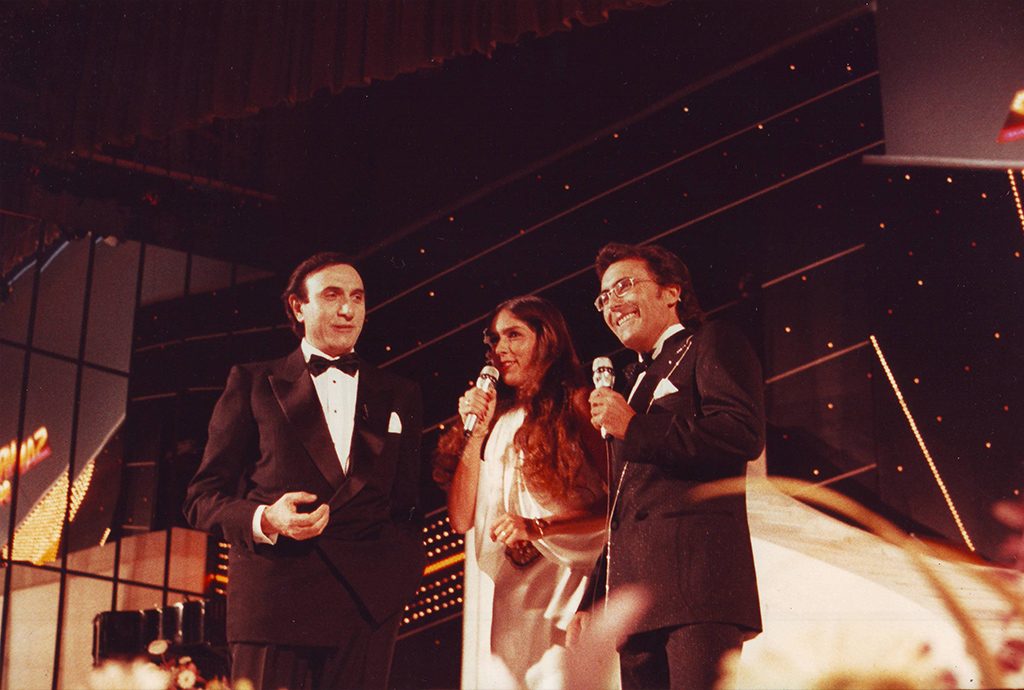
Synopsis
The 34th edition of the Festival features the return of TV host Pippo Baudo. after a 16-year absence. With him, on the Ariston stage, are Elisabetta Gardini, Edy Angelillo, Tiziana Pini, Iris Peynado, Isabella Rocchietta and Viola Simoncini.
Rai broadcasts live all three evenings of the festival.
During the first evening, about 2000 metalworkers from the Italsider factory demostrate outside the Ariston theatre against the threat of the factory closure.in Genova.
The host welcomes 16 of them on stage becoming a spokesperson for the men’s demand. Baudo is acclaimed by all and is renamed Super Pippo.
The 36 competing songs are divided into two categories: Big and Newcomers, and are voted separately by the audience via Totip cards.
The 20 Big, who go directly to the final, are invited to perform on the first night while the second night is reserved to the 16 proposed new that compete for the 8 final places.Competing songs:
Big section
Ci sarà – Al Bano e Romina Power
Serenata – Toto Cutugno
Cara – Christian
Un amore grande – Pupo
Non voglio mica la luna – Fiordaliso
Nina – Mario Castelnuovo
Non scendo – Anna Oxa
Regalami un sorriso – Drupi
Chi – Iva Zanicchi
Per una bambola – Patty Pravo
Anni ruggenti – Gruppo Italiano
Ancora ti vorrei – Bobby Solo
Libera – Donatella Milani
Come si cambia – Fiorella Mannoia
Amore amore – Marisa Sannia
La bottega del caffè – Alberto Camerini
Serena alienazione – Riccardo Del Turco
Radioclima – Garbo
Nuovo swing – Enrico Ruggeri
Allo stadio – StadioNewcomers section
Finalists songs
Terra promessa – Eros Ramazzotti
Solo con l’anima mia – Marco Armani
Aspettami ogni sera – Flavia Fortunato
Sonnambulismo – Canton
Notte di luna – Valentino
Principessa delle rose – Ivano Calcagno
Lei balla sola – Fabio Vanni
Walkin’ – Dhuo
No finalists
Acqua alta in piazza San Marco – Giampiero Artegiani
La Fenice – Santandrea
I’m in Love With You – Luigi Sutera
Madame – Rodolfo Banchelli
Mondorama – Richter, Venturi e Murru
Pomeriggio a Marrakech – I Trilli
Quanto ti amo – Collage
Se ti spogli – Giorgia FiorioThe song “Ci sarà” by Al Bano e Romina Power wins in the Big section while “Una terra promessa” by Eros Ramazzotti wins among the proposed new. .
Guest artists: Beppe Grillo, Nino Manfredi, Pippo Franco, Renzo Montagnani, Jerry Calà, Marina Suma, Queen, Paul Young, Randy Crawford, Jair Rodriguez e Jairzinho, Culture Club, Gilbert Montagnè, El Puma, David Knopfer, Claudio Villa, Alida Chelli, Steven Schlacks, Mario Merola, Bonnie Bianco, Pierre Cosso. -
Year 1985 Episodes 3 Channel Rai 1 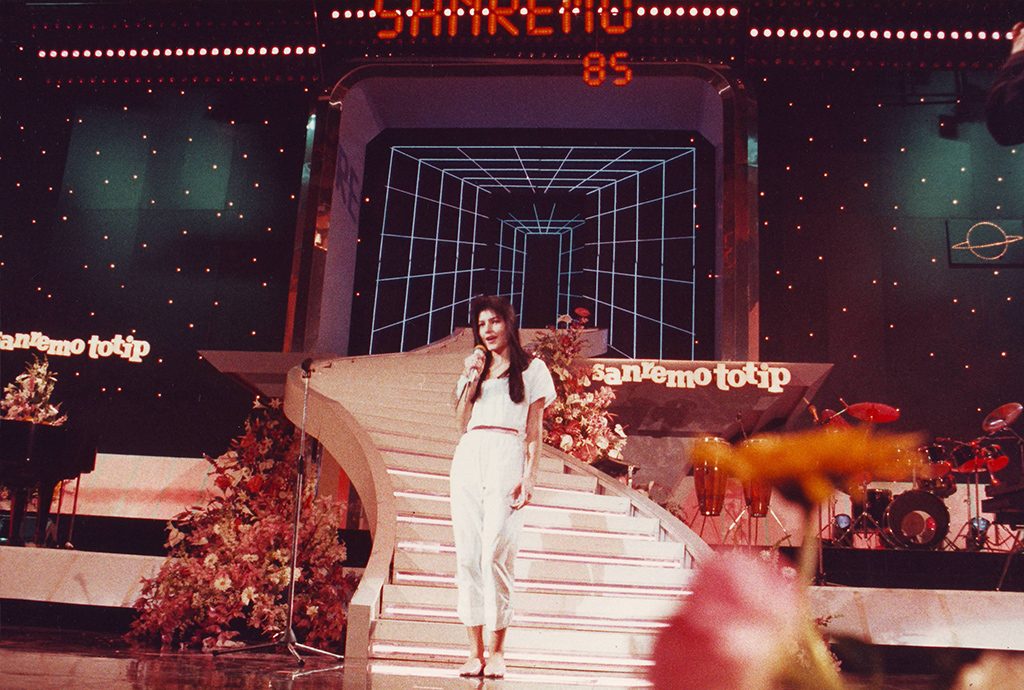
Synopsis
1985
The Ariston Theatre welcomes once again the 35th edition.of the Sanremo Festival
The host is Pippo Baudo flanked by the Dutch singer and showgirl Patty Brard.
The 1985 edition is largely identical to that of the previous year. The singers are in fact divided into two categories, Big and Newcomers separately voted by the audience via Totip cards.
The event, is broadcasted live by Rai and for the first time is also trasmitted on the radio.
Also in this edition, the 22 Big go directly to the final and are invited to perform on the first night while the second night is reserved for the 16 proposed new that compete for the 8 final places.Competiting songs:
Big section
Se m’innamoro – Ricchi e Poveri
Noi ragazzi di oggi – Luis Miguel
Chiamalo amore – Gigliola Cinquetti
Sulla buona strada – Riccardo Fogli
Notte serena – Christian
Una storia importante – Eros Ramazzotti
A lei – Anna Oxa
Il mio angelo – Fiordaliso
E mo’ e mo’ – Peppino Di Capri
Souvenir – Matia Bazar
Tu, dimmi, un cuore ce l’hai? – Marco Armani
Fammi volare – Drupi
Ritratto – Franco Simone
Via con me – Eduardo De Crescenzo
Grande Joe – Banco del Mutuo Soccorso
Da quando non ci sei – Dario Baldan Bembo
Franca ti amo – Ivan Graziani
Vorrei svegliarti – Eugenio Finardi
Buona fortuna – Mimmo Locasciulli
Faccia di cane – New Trolls
Donne – Zucchero & Randy Jackson Band
Cose veloci – GarboNewcomers section
Finalists
Niente di più – Cinzia Corrado
Me ne andrò – Miani
Innamoratevi come me – Lena Biolcati
Bella più di me – Cristiano De André
Occhi neri – Marco Rancati
Se ti senti veramente un amico – Stefano Borgia
A goccia a goccia – Lanfranco Carnacina
Sul mare – Antonella Ruggiero (omonima della vocalist dei Matiza Bazar)
No finalists
Bella gioventù – Rodolfo Banchelli
Che amore è – Claudio Patti
Firenze, piccoli particolari – Laura Landi
Il viaggio – Mango
Lasciamoci andare – Antonio Valentini
Luna nuova – Silvia Conti
Saranno i giovani – Roberto Kunstler
Volti nella noia – Champagne MolotovThe Ricchi e Poveri, newly disbanded from Marina Occhiena, win with the song “Se m’innamoro”. Second place goes to the young Luis Miguel with his song “Noi ragazzi di oggi”. Miguel is only fifteen but is already the winner of six gold and eight platinum track records and has already recorded four albums
Gigliola Cinguetti, who came back to Sanremo after twelve years, gets third place.
Eros Ramazzoti, who won the Newcomers’ category the previous year, takes part in Sanremo Festival again in the Big category with the song “Una storia importante” winning sixth place.
The song, considered one of the most significant songs of the roman singer, sells millions of copies and become a huge hit in many European countries,
Special prizes are also awarded by the press this year and Is Pippo Baudo himself to reveal this to the public.:
“Radio Corriere TV” awards Gigliola Cinguetti as “the most significant personality” in the history of the Festival.
Onda TV awards Luis Miguel as “Best New Personality”
Telesette awards Edoardo De Crescenzo for “Best Voice”
Telegatto “TV Sorrisi e Canzoni” awards Duran Duran. for the “Most successful foreign band”.
The 1985 edition is also remembered for the Duran Duran exhibition that caused mass hysteria among the teenage fans. Simon le Bon, the leader of the band, appears on the final evening with his foot in a cast for injuries sustained in a night club.Guest artists are: Josè Luis Moreno, Bebbe Grillo, Renato Pozzetto, Francesco Nuti, Giuliana De Sio, Bronski Beat, El Puma, Jermain Jackson e Pia Zadora, Chaka kahn,
Frankie Goes To Hollywood, Gino Vanelli, Duran Duran, Talk Talk, Sade, Spandau Ballet, Claudio Baglioni, Sam Harris, Village People, Phil Collins, Claudio Villa, Claudia Mori, Angelica e i Mariaki, Katia Ricciarelli e Adriano Celentano. -
Year 1986 Episodes 3 Channel Rai 1 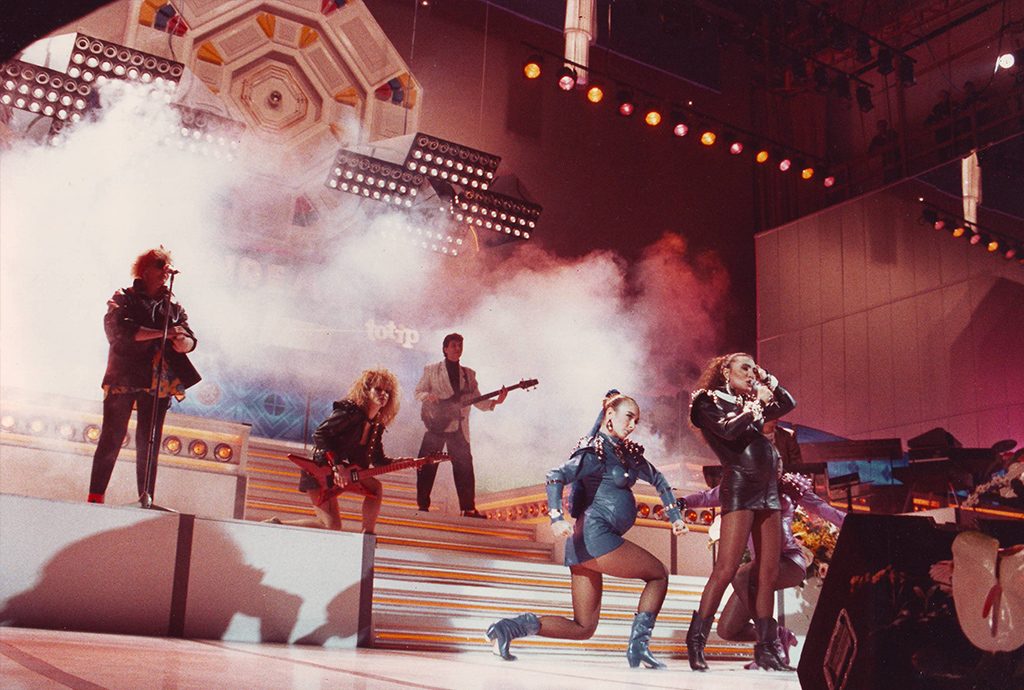
Synopsis
For the first time in the Festival history, the 1986 edition will have a woman hosting the event.
Loretta Goggi will present the 36th Sanremo Festival together with Anna Pettinelli , Mauro Micheloni and Sergio Mancinelli.
The three evenings of the festival are broadcasted live on radio and television by Rai 1.
After many years of lip-syncing, the artists start performing live again even if they sing with a backing sound track.
As in the previous edition, the artists are divided into two sections, Big and Newcomers, the first made of 18 veteran artists and the second features 14 debuting singers.
The voting system remains unchanged: the audience can express its preference via Totip carts.Competiting songs
Big Section
Adesso tu – Eros Ramazzotti
Il clarinetto – Renzo Arbore
Senza un briciolo di testa – Marcella
Azzurra malinconia – Toto Cutugno
È tutto un attimo – Anna Oxa
Futuro – Orietta Berti
Vai – Nino D’Angelo
Cantare – Fred Bongusto
Re – Loredana Bertè
Fatti miei – Fiordaliso
Uno sull’altro – Marco Armani
Canzone italiana – Sergio Endrigo
Amore stella – Donatella Rettore
Lei verrà – Mango
Innamoratissimo – Righeira
No East, No West – Scialpi
Rien ne va plus – Enrico Ruggeri
Via Margutta – Luca Barbarossa
Verso il 2000 – Flavia Fortunato
Brividi – Rossana Casale
Canzone triste – Zucchero
Canzoni alla radio – StadioNewcomers Section
Finalists songs
Grande grande amore – Lena Biolcati
La nave va – Aleandro Baldi
E le rondini sfioravano il grano – Giampiero Artegiani
E camminiamo – Lanfranco Carnacina
Ipnotica – Meccano
Ma non finisce mica qui – Francesco Hertz
Come una guerra – Chiari e Forti
No finalists
Azzurra anima – Nova Schola Cantorum
Croce del sud – Aida Satta Flores
L’uomo di ieri – Paola Turci
Nessun dolore – Anna Bussotti
Quando l’unica sei tu – Ivano Calcagno
Ribelle su questa terra – Miani
Scherzi della vita – Gigi PanceriThe 36th edition is known as “the Women Festival”. Loretta Goggi, not only is the first woman ever to conduct the Festival, but also the performer of the opening theme “Io nascerò”.
Compared to the past editions, there is a large numer of female artists among which stand out Donatella Rettore, Marcella Bella, Anna Oxa, Flavia Fortunato, Orietta Berti, Rossana Casale, Fiordaliso and especially Loredana Bertè, who comes on stage wearing a fake pregnancy and is backed up by her two vocalists wearing maternity clothes.
The 1986 is also the year of the definitive recognition of Eros Ramazzotti, who wins with the song “Adesso tu.
Second place goes to Renzo Arbore with Il Clarinetto,,just back from two great television hits Quelli della notte e Indietro tutta. Marcella Bella is awarded third place with the song Senza un briciolo di testa.
During the event, there is a special competition called “Sanremo Video” to award the best video clip of unreleased foreign pieces.
David Bowie, wins with “Absolute beginners” despite the partecipation of famous artists such as Mick Jagger, Simple Mind and Talking
Guest artists are:
Drum Theatre, Sting, Spandau Ballet, Menudo, Mr. Mister, Double, Prefab Sprout, Fine Young Cannibals, Talk Talk, Depesce Mode, King, Falco, Viki Carr. -
Year 1987 Episodes 3 Channel Rai 1 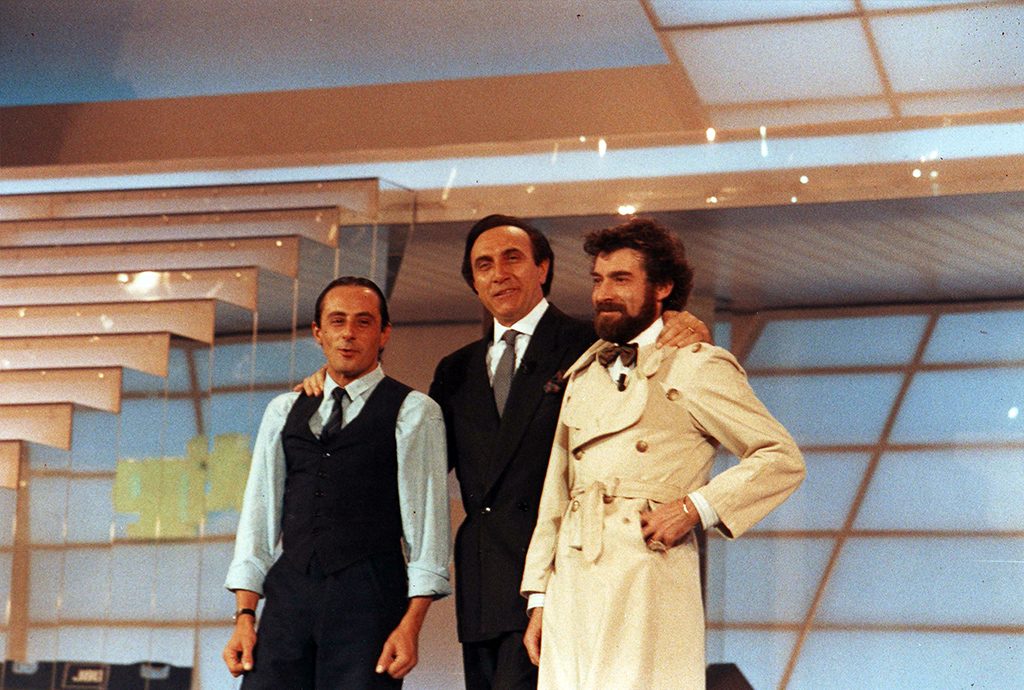
Synopsis
The 37th Festival edition is hosted by Pippo Baudo broadcasting live from the Ariston Theatre and by Carlo Massarini, live from the Pala Rock.
The 40 competing artists are divided into two categories: Big and Newcomers.
The 24 big artists, are voted by the public via Totip carts and the first two evenings are dedicated to them.
The 16 newcomers compete on the third evening to get to the final.Competiting songs
Big section
Si può dare di più – Gianni Morandi, Enrico Ruggeri e Umberto Tozzi
Figli – Toto Cutugno
Nostalgia canaglia – Al Bano e Romina Power
Io amo – Fausto Leali
Il sognatore – Peppino Di Capri
Tanti auguri – Marcella
Canzone d’amore – Ricchi e Poveri
Quello che le donne non dicono – Fiorella Mannoia
Come dentro un film – Luca Barbarossa
Aria e musica – Christian
Vita mia – Lena Biolcati
Destino – Rossana Casale
Canto per te – Flavia Fortunato
E non si finisce mai – Dori Ghezzi
L’odore del mare – Eduardo De Crescenzo
Bella età – Scialpi
Dimmi che cos’è – Le Orme
Dal cuore in poi – Mango
Sinué – Tony Esposito
Pigramente signora – Patty Pravo
Il Garibaldi innamorato – Sergio Caputo
Madonna di Venere – Mario Castelnuovo
Rosanna – Nino Buonocore
Bolero – NadaNeecomers section
Finalists
La notte dei pensieri – Michele Zarrillo
Straniero – Miki
Briciole di pane – Future
Notte di Praga – Andrea Mirò
Un bacio alla mia età – Enrico Cifiello
La forza della mente – Claudio Patti
In volo nel futuro – Ricky Palazzolo
Fai piano – Mariella Nava
No Finalists
Campi d’atterraggio – Chiari e Forti
Conta chi canta – Umberto Marzotto
L’esteta – Paolo Scheriani
Ma che bella storia – Teo
Nel mio profondo fondo – Alessandro Bono
Non cadere mai in ginocchio – Berger
Primo tango – Paola Turci
Stringimi le mani – Charley DeanesiThe song “Si può dare di più” by Gianni Morandi, Enrico Ruggeri e Umberto Tozzi wins first place, followed by “Io amo” by Fausto Leali and “Figli” by Toto Cutugno.
“Pigramente Signora” by Patty Pravo is accused of plagiarism after a group of young viewers recognize some similarities with the song “To the morning” recorded by Dan Fogelbergn in the 1972.
On Saturday February 7th at 11.10 p.m. during the final evening,, Pippo Baudo announces some sad news: Claudio Villa, “the reuccio” has passed away.
Guest artists: Giorgio Faletti, Witney Houston, Paul Simon, The Bangles, Tom Robinson, Cutting Crew, Spandau Ballet, Level 42, Bob Geldof, Simply Red, Erasure, Frankie Goes To Holliwood, Nick Kamen, Pet Shop Boys, Eight Wonder, The Smiths, Europe, Style Council, Duran Duran. -
Year 1988 Episodes 3 Channel Rai 1 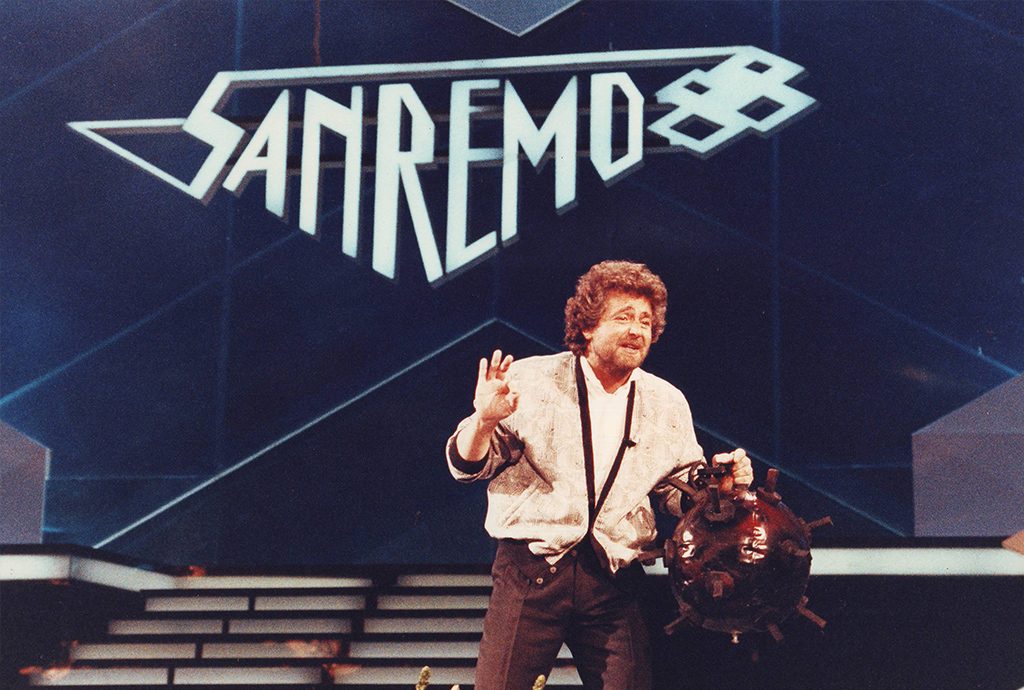
Synopsis
In the 1988 the Festival presenters are Miguel Bosè and Gabriella Carlucci.
Carlo Massarini is broadcasting from Pala Rock once again while Kay Sandvic, Lara St.Paul e Memo Remigi broadcast live from a new location, the Casinò.
Beppe Grillo with his transgressive satire, will provide colorful humor to the Festival.
Aldo Biscardi, together with Sandro Paternostro, hosts “Festival on Trial”, during which artists and journalists are set up against each other.
There are 42 competing artists, divided into 26 Big and 16 Newcomers, who are voted via totip cartsCompetiting songs
Big Section
Perdere l’amore – Massimo Ranieri
Emozioni – Toto Cutugno
L’amore rubato – Luca Barbarossa
Dopo la tempesta – Marcella
Mi manchi – Fausto Leali
Italia – Mino Reitano
Quando nasce un amore – Anna Oxa
Per noi – Fiordaliso con Claudio Cabrini
Nascerà Gesù – Ricchi e Poveri
Le notti di maggio – Fiorella Mannoia
Inevitabile follia – Raf
Sarà per te – Francesco Nuti
Io (per le strade di quartiere) – Franco Califano
Nella valle dei Timbales – Figli di Bubba
Come un giorno di sole – Michele Zarrillo
Io – Loredana Bertè
Nun chiagnere – Peppino Di Capri
Andamento lento – Tullio De Piscopo
La prima stella della sera – Matia Bazar
Era bella davvero – Drupi
Il mondo avrà una grande anima – Ron
Una bella canzone – Flavia Fortunato
Cielo chiaro – New Trolls
Ma che idea – Denovo
Le tue chiavi non ho – Nino Buonocore
Come per miracolo – Alan SorrentiNewcomers Section
Finalists
Canta con noi – Future
Una carezza d’aiuto – Stefano Palatresi
Per noi giovani – Lijao
Ogni tanto si sogna – Miki
Io con te – Giorgia Fiorio
La notte delle favole – Tania Tedesco
Sarò bellissima – Paola Turci
Se fosse vero – Stefania La Fauci
No Finalists
Canto bolero – Stefano Ruffini
L’ultima bugia – Fabio De Rossi
Mama – Ice
Non è segreto – Andrea Mirò
Sarà forte – Bungaro
Sogno – Mietta
Uno spiraglio al cuore – Mariella Nava
Voglio vivere in un attimo – Biagio AntonacciMassimo Ranieri wins with the song “Perdere l’amore”, the same song that wasexcluded during the pre-selection phase, the previous year, when the festival was hosted by Gianni Nazzaro.
The Future wins with the song “Canta con noi” for the newcomers section
Guests artists: Paul Mc Cartney, Chris Rea, Brian Ferry, Wendy & Lisa, Joe Cocker, Johnny Hates jazz, INXS, Def Leppard, A-Ha, Manhattan Transfer, Belinda Carlise, Terence Trent D’Arby, The Christians, Bon Jovi, Rick Astley, Guesh Patti, Eight Wonder, Back, Debbie Gibson, Sinitta, Wet Wet Wet, Robbie Robertson, Art Garfunkel, B.B. King, Sandie Show, Paul Anka, Antoine. -
Year 1992 Episodes 4 Channel Rai 1 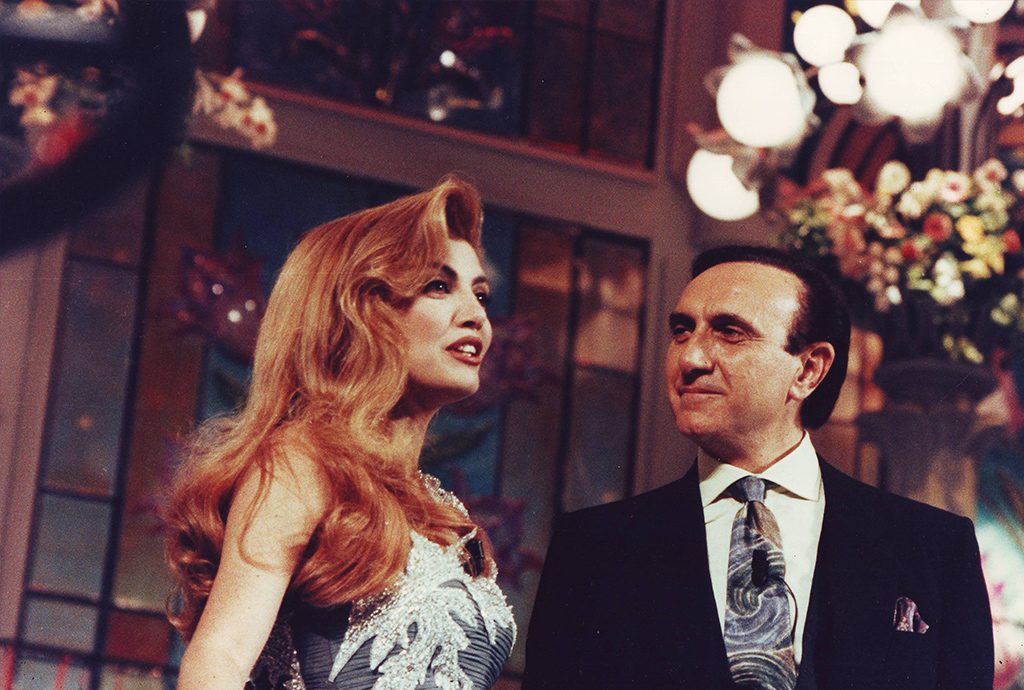
Synopsis
The 42nd Sanremo Music Festival takes place from February 26th to the 29th, at the Ariston theatre.
It is broadcasted live by Rai 1 for its entire duration and also by radio on Radio 1.
Once again, Pippo Baudo presents together with Brigitte Nielsen, Alba Parietti and Milly Carlucci.
A new feauture of the Festival is the Aterfestival, hosted by Sandro Ciotti, Vincenzo Mollica, Luciano De Crescenzo, Gianni Ippoliti under the supervision of Pippo Baudo.
The competiting songs are 42, divided into 24 Big, who have to compete for the 15 spots of the final and the 18 newcomers who compete for the 9 spots reserved for the Newcomers.
In this edition, songs are presented only once and there will be no duet with foreign guestCompetiting song
Big Section
Finalists songs
Portami a ballare – Luca Barbarossa
Gli uomini non cambiano – Mia Martini
La forza della vita – Paolo Vallesi
Italia d’oro – Pierangelo Bertoli
Ti penso – Massimo Ranieri
Piccoli giganti – Matia Bazar
Per niente al mondo – Flavia Fortunato e Franco Fasano
Pitzinnos in sa gherra – Tazenda
Perché – Fausto Leali
In una notte così – Riccardo Fogli
Strade di Roma – Michele Zarrillo
Mendicante – Mariella Nava
Un uomo in più – Drupi
Favola blues – Peppino Di Capri e Pietra Montecorvino
Quelli come noi – New Trolls
No Finalists songs
Così lontani – Ricchi e Poveri
È una nanna – Scialpi
Femmene ‘e mare – Lina Sastri
Io ti darò – Paolo Mengoli
La mia preghiera – Pupo
Ma ti sei chiesto mai – Mino Reitano
Pe’ dispietto – Nuova Compagnia di Canto Popolare
Rumba di tango – Giorgio Faletti e Orietta Berti
Un frammento rosa – Formula 3Newcomers Section
Finalists
Non amarmi – Aleandro Baldi e Francesca Alotta
Come una Turandot – Irene Fargo
Con un amico vicino – Alessandro Bono e Andrea Mingardi
Che ne sai della notte – Lorenzo Zecchino
Amica di scuola – Patrizia Bulgari
Brutta – Alessandro Canino
Non è colpa di nessuno – Rita Forte
Uomo allo specchio – Massimo Modugno
Abbiamo vinto il Festival di Sanremo – Statuto
No Finalists
Cosa farà Dio di me – Tosca
Datemi per favore – Bracco Di Graci
Io scappo via – Aida Satta Flores
L’amore va oltre – Gatto Panceri
Piccola Africa – Stefano Polo
Principessa scalza – Andrea Monteforte
Sai cosa sento per te – Tomato
Un altro mondo nell’universo – Giampaolo Bertuzzi
Zitti zitti – AeroplanitalianiThe song “Portami a ballare”, written and performed by Luca Barbarossa, wins first place.
The 1992 edition will be known as one full of turn of events and controversies. Among these, the uninvited presence on stage by Mario Appignani, known as “Crazy Horse and the insinuations of Pupo who states that his song was eliminated because of rigged voting.
Mia Martini, whose song “Gli uomini non cambiano” written by Giancarlo Bigazzi was the favorite by journalists, but gets only second place
The song Pe’ dispietto” by Nuova Compagnia di Canto Popolare wins the Critics Award, although it didn’t qualify for the final.
In the newcomers cathegory the song Non amarmi” performed by Aleandro Baldi e Francesca Alotta wins first place. -
Year 1993 Episodes 4 Channel Rai 1 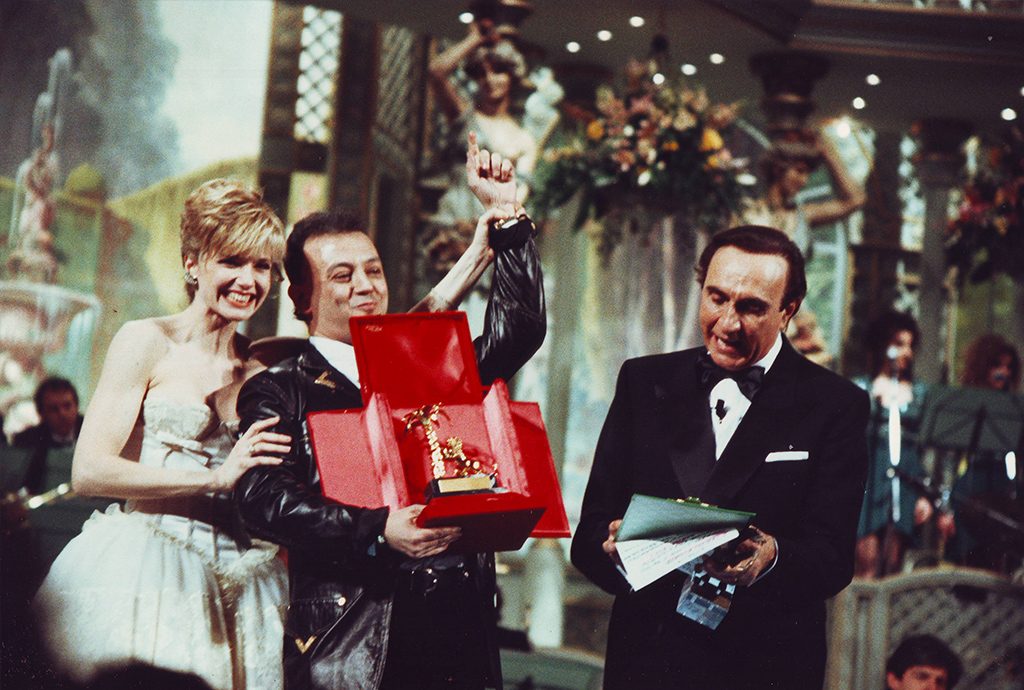
Synopsis
The 41st Sanremo Music Festival was held from February 23rd to the 27th at the Ariston theatre.
It was hosted by Pippo Baudo and Lorella Cuccarini. The Afterfestival was hosted by Alba Parietti, who the previous year did not appreciate her second class arrangement behind Baudo.Lorella Cuccarini was also the host of the successful tv program “Buona Domenica” and Alba Parietti who directed one less popular season of “Domenica In”, resented the role assigned to her. This culminated in an exchange of unpleasant bickering backstage which was recorded by gossip magazines.
Competiting songs
Big section
Finalists
Mistero – Enrico Ruggeri
Dietro la porta – Cristiano De André
Gli amori diversi – Rossana Casale e Grazia Di Michele
Dedicato a te – Matia Bazar
Ave Maria – Renato Zero
Figli di chi – Mietta e i Ragazzi di Via Meda
Stato di calma apparente – Paola Turci
Non so più a chi credere – Biagio Antonacci
Notte bella, magnifica – Amedeo Minghi
Un anno di noi – Francesca Alotta
Sogno – Andrea Mingardi
L’Italia è bbella – Roberto Murolo
Qui gatta ci cova – Tullio De Piscopo
Stiamo come stiamo – Loredana Bertè e Mia Martini
Una canzone d’amore – Nino BuonocoreNo Finalists
Balla italiano – Jo Squillo
Cambiamo musica – Ladri di Biciclette e Tony Esposito
Come passa il tempo – Maurizio Vandelli, Dik Dik e Camaleonti
Dammi 1 bacio – Francesco Salvi
L’alba – Peppino Gagliardi
La voce delle stelle – Peppino di Capri
Sulla strada del mare – Schola Cantorum
Tu tu tu tu – Alessandro Canino
Uomini addosso – MilvaNew proposal section
Finalists
La solitudine – Laura Pausini
Ma non ho più la mia città – Gerardina Trovato
In te – Nek
Guardia o ladro – Bracco Di Graci
L’amore vero – Erminio Sinni
Non volevo – Rosario Di Bella
Non è tardi – Marco Conidi
Non ci prenderanno mai – Fandango
Quello che non siamo – Tony Blescia
No Finalists
A piedi nudi – Angela Baraldi
Caramella – Leo Leandro
Ci vuole molto coraggio – Luca Manca, Luca Virago, Emanuela e Gabriele Fersini
Femmene – Niné
Femmina – Marcello Pieri
Finché vivrò – Lorenzo Zecchino
Il mare delle nuvole – Antonella Bucci
Non dire mai – Cliò
Tu con la mia amica – Maria Grazia ImperoEnrico Ruggeri won with the song “Mistero” in the Champions section while Laura Pausini, just 18 years old, won with “La solitudine” in the New Artists section. The young singer from Romagna will become in a very short time an international star.
In this edition too, the finalists in both cathegories were chosen by the votes of Doxa selection boards.

 Italiano
Italiano










